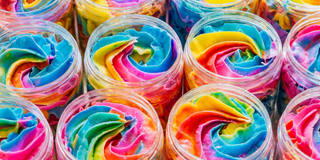You’re looking to make more ethical purchasing decisions, which means that you’re now trawling through pages upon pages of products labelled with terms like ‘cruelty-free’, ‘vegan’ or even ‘animal testing where required by law’… but what do they mean?
Well, as a business that is both vegan and cruelty-free, we know a thing or two about how dizzying it can get trying to keep up with the terminology.
And if you want to make your life a lot easier, knowing the right terminology and what to look for can save you a lot of time.
So, when it comes to cruelty-free vs vegan cosmetics… what’s the difference, and why does it matter?
The short answer
If a product is labelled as cruelty-free, then it hasn’t been tested on animals.
If a product is labelled as vegan, then it doesn’t contain any animal-derived ingredients or by-products.
Easy, right?
Well, unfortunately, a lot of confusion still arises when a product is labelled as only one of these terms, as many people mistakenly assume that the two terms are interchangeable.
But a product can be vegan but not cruelty-free, and vice versa!
Now that you’re done scratching your head, why don’t we get into cruelty-free vs vegan in a bit more depth?
The cruelty-free cosmetics lowdown
Did you know that there isn’t a legal definition for the term ‘cruelty-free’ when it comes to cosmetics?
It can make navigating the cosmetic industry a bit like being in the Wild West (yeehaw?).
Generally speaking, cruelty-free means that there has been no animal testing on the cosmetic product, from the ingredients and formulation to the finished product itself.
Take our products here at Scentish as an example. All of our products are cruelty-free, as the ingredients, formulations and finished products have never been (and will never be) tested on animals.
Here’s where it can get tricky, though.
Companies that sell their products in China can’t always* be considered cruelty-free, as Chinese law requires mandatory animal testing on all cosmetic products manufactured outside of China.
Big brands such as Chanel, Dior, Lancome, Revlon, L’Oreal and Nivea sell their products in China – likely due to the cosmetics market being worth millions – and can therefore not be classed as cruelty-free.
So, when you see a brand say that they ‘only test on animals when required by law’, they’re likely referring to their trade in China and the fact that they can’t be considered a cruelty-free brand as a result.
It’s a lot of information to take in, isn’t it?
*In China, animal testing is still required by law in 2023, however, some beauty brands have been able to sell their products in China without testing them on animals first (bypassing this by selling online-only in the region).
The confusing part of cruelty-free cosmetics
Yeah, we know – how much more confusing can it get?
Wellll, unfortunately, there’s still a little more you might need to know to approach your cruelty-free cosmetics shopping with confidence.
We’re talking about parent companies.
For example, popular skincare brand Drunk Elephant is owned by parent company Shiseido, which does test on animals, and cosmetics brand NYX is owned by parent company L’Oreal, which does test on animals.
This can mean that, though you’re putting your money towards a brand that doesn’t test on animals, you’re indirectly supporting a parent company that does.
Go figure!
The vegan cosmetics lowdown
If a product contains ingredients derived from animals, it can’t be classed as vegan, in short!
That means that there could be a brand that is cruelty-free but doesn’t have vegan products.
Let’s take Lush as an example – Lush is a cruelty-free business, and the majority of their products are vegan, however, the few that aren’t contain ingredients such as honey or lanolin.
This is where it becomes slightly easier to spot vegan products (if they aren’t blatantly advertised or labelled as vegan).
Ingredients such as beeswax, honey, lanolin, carmine, sericin, glycerine, squalene, stearic acid, collagen, and keratin are all animal-derived and commonly found in non-vegan cosmetics.
Of course, there are now plenty of vegan alternatives to the above ingredients, such as soy protein, almond oil, vegan stearic acid (derived from plant fats), and vegetable glycerine and Olive Squalae, both of which we use .
The confusing part of vegan cosmetics
Well, really, pinpointing vegan cosmetics isn’t as finnicky as cruelty-free cosmetics, to be honest!
The main thing you’re looking for is a lack of animal-derived ingredients and the vegan symbol on the product packaging, if applicable (usually a variation of the letter ‘V’ or the world vegan itself).
Usually, the primary confusion comes from assuming cruelty-free and vegan are the same, and we assume that we’re past that point now!
Not that you asked, either, but Scentish is also a vegan company – it makes it a bit easier to navigate our website with confidence, rather than reading through each ingredient description with a magnifying glass.
In summary
A company can have cruelty-free but not vegan cosmetics, and a company could have vegan cosmetics that aren’t cruelty-free.
(Or if you’re Scentish, you have vegan and cruelty-free cosmetics… at an affordable price.)
The important thing is to know what you’re looking for to guarantee the status of each cosmetic product to make sure it aligns with your values.
After all, in this day and age, there are so many alternatives out there that can match your ethical values instead if a brand is falling short.
Why not have a peep at our bestsellers – no research necessary, as they’re all vegan and cruelty-free!


